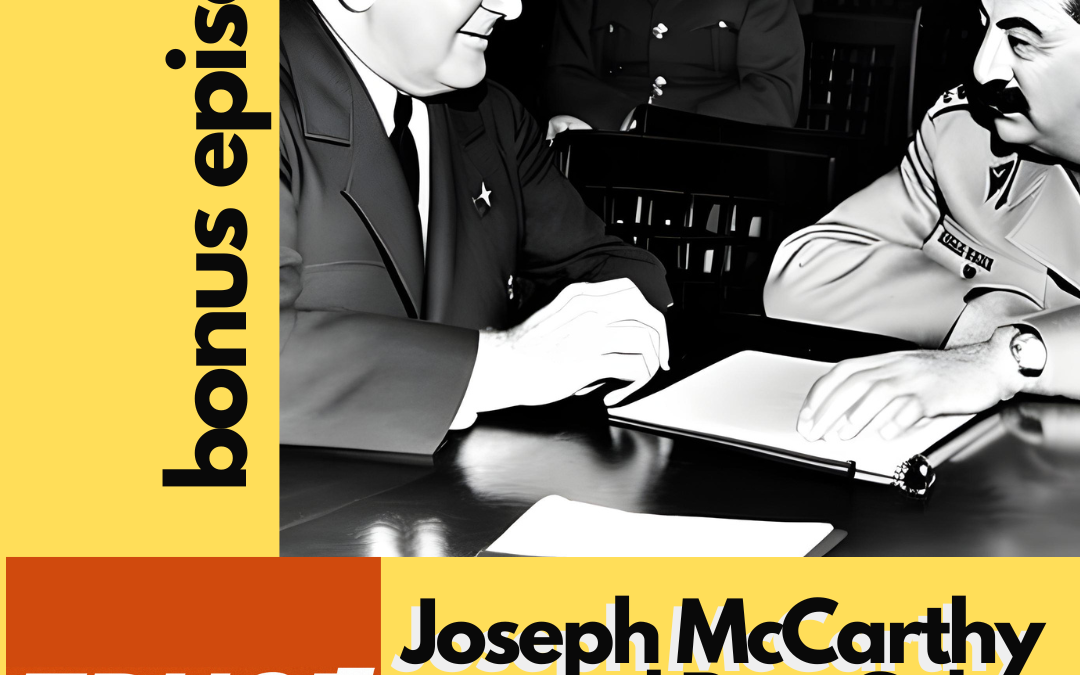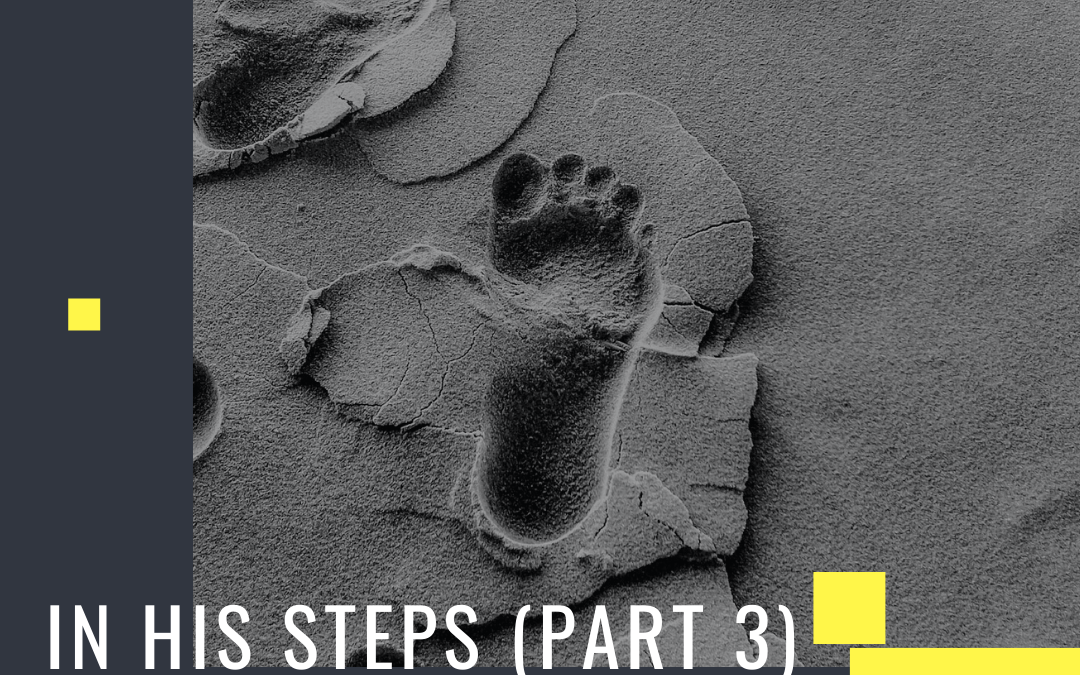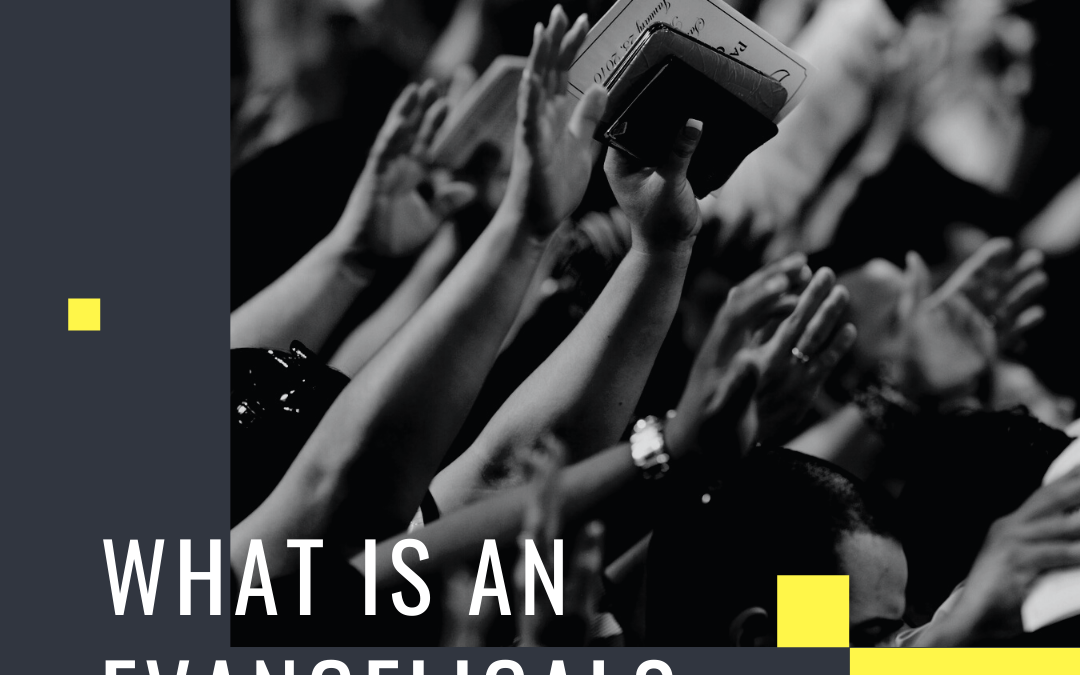
by Chris Staron | Sep 12, 2023 | Episodes
Give to help Chris make Truce!
Joseph McCarthy’s Search for Communists in the American Government
Joseph McCarthy was an unexceptional junior congressman from Wisconsin. He grew up brawling in the streets, playing cards, and embellishing his stories. Then, during a Lincoln Day address in 1950, Joseph McCarthy told an audience that he had a list of 205 communists working in the government. Within days, he was a household name.
McCarthy started “investigating” suspected communists in the American government, focusing on the US State Department. Along the way, he brought in a young lawyer named Roy Cohn. Cohn was already known for his work sending Julius and Ethel Rosenberg to the electric chair. Now, he and McCarthy bullied and cajoled during private hearings. Being labeled a communist, or even a suspected communist could ruin a person’s career. People committed suicide rather than face their scrutiny.
Roy Cohn was Donald Trump’s Mentor
Their reign lasted four years, ending in the televised broadcasts of the Army-McCarthy hearings in which a lawyer asked if McCarthy had any decency. That was pretty much it for McCarthy. But Roy Cohn went on to have a well-connected career, providing legal services for the mob and Rupert Murdoch, owner of Fox News. He also became a mentor to a young real estate mogul named Donald Trump. Famous people like Andy Warhol attended his birthday party at Studio 54. Cohn died of AIDS, something that was killing gay men rapidly in the 1980s, though he denied he ever had it.
This is the story of two men allowed to prey on the fears of the American people for their own gain. One fell hard, the other found himself fighting against his own people.
Larry Tye, author of “Demagogue”
In this episode, Chris interviews Larry Tye, author of the book “Demagogue”. He’s also the author of “Satchel: The Life and Times of an American Legend” and “Bobby Kennedy: The Making of a Liberal Icon”.
Sources:
- “Demagogue” by Larry Tye
- Helpful article about the Rosenbergs
- Article about Klaus Fuchs
- McCarthy’s speech in Wheeling, WV
- New York Times, February 23, 1954. Pages 16-17 “Transcript of General Zwicker’s Testimony Before the McCarthy Senate Subcommittee”
- Video from Army-McCarthy hearings (forward to the last 20 minutes if you want to jump to the stuff I used)
- The guest list for Roy Cohn’s birthday at Studio 54
Discussion Questions:
- Why do we love demagogues?
- Who are other demagogues in American history?
- The threat of communists in the government in the 1950s is sometimes downplayed. Do you think it was a real concern?
- McCarthy ran for Congress in an illegal way while still in the Marines. How do you feel about that?
- Roy Cohn sometimes went against his own people, claiming that gay people did not deserve equal rights. What might have been his motivation?
- Do you see any crossover between McCarthy, Cohn, and Donald Trump?
- Cohn died of AIDs in the 1980s when the disease was at its peak. Why might he have wanted to keep his illness a secret?

by Chris Staron | Oct 11, 2022 | Episodes
The Fundamentals of the Christian faith
Between 1910 and 1915 a collection of 90 essays was distributed by two wealthy oil magnates. These essays attempted to nail down the basics of the Christian faith and counteract the growing modernist movement. “The Fundamentals” is often mentioned in history books about Christian fundamentalism, but it is rare for anyone to discuss the essays themselves. So I thought we should break down at least 6 of them together!
I’m joined this episode by some good friends to introduce you to “The Fundamentals”. This influential time capsule document takes us inside the proto-fundamentalist movement, just before it really took off.
Discussion Questions:
- What would you include in your own list of fundamentals?
- Is creationism fundamental? What is the role of evolution in our modern theology?
- The fear of evolution wasn’t just about people thinking we’d come from chimps. It also revolved around concerns of people applying evolution to other areas of life. How have you seen evolution applied to other studies?
- Is the Bible inerrant? What does that mean?
- Have you read the full Bible yourself? Why or why not?
Essays we read:
- “My Experience With the Higher Criticism” by JJ Reeve
- “The Deity of Christ” by BB Warfield
- “The Certainty and Importance of the Bodily Resurrection of Jesus Christ from the Dead” by Reuben Torrey
- “Science and Christian Faith” by James Orr
- “Evolutionism in the Pulpit” by “An Occupant of the Pew”

by Chris Staron | Aug 2, 2022 | Episodes
In His Steps free audiobook
This is part 3 of an audiobook presented on Truce. Please start at part 1!
Become a patron of the show to keep more content like this coming your way!
In His Steps by Charles Sheldon is a classic of Christian fiction. It is also one of the top-selling Christian books of all time. We’ve been running through the history of Christian fundamentalism this season. It’s worth noting that fundamentalism was a reaction to liberal theology, especially modernism. Another form of liberal theology was the “Social Gospel”. It was a movement led by people like Walter Rauschenbusch that emphasized the socially conscious aspects of Christianity, while simultaneously downplaying evangelism.
Christian fundamentalists did not like the Social Gospel. For one thing, it had a positive view of human progress. It said that the world could get better and better and then Jesus would return. Christian fundamentalists generally think that world history trends downward.
I’m presenting this original audio recording for many reasons. I think this book offers a great window into the era in which it was created (the late 1800s). It also represents the Social Gospel and a slice of the Holiness movement quite well. Finally, I think we need to hear this story in our modern context. Modern Christian churches are divided. What would happen if we dared to ask “What Would Jesus Do?”
Things to track as you listen:
- The role of women in this society
- Wealthy attitudes toward the poor
- The genesis of financial woes in this book is sometimes economic crisis (the late 1800s was full of panics and recessions) and sometimes sin based
- The Holiness movement and those who object to it
- Is this book evangelistic? If so, how is the gospel presented? If not, what does this book leave out?
- The overall positive view of human progress
- Social movements like the pure foods movement, temperance, suffrage, anti-gambling

by Chris Staron | Feb 1, 2022 | Episodes
Donate to support the Truce Podcast!
Who is an evangelical?
Who is an evangelical? If you go by the news today, you probably think evangelicals are all American middle-class white men. Nope! Evangelical Christians come in all shapes, colors, and sizes. They can be men or women from anywhere in the world. They can speak any language. And they can have a lot of variety in their beliefs.
This season on the Truce Podcast we are examining the history of Christian fundamentalism. How did fundamentalism begin? What is Christian fundamentalism? Is Christian fundamentalism a good thing, a bad thing, or somewhere in between?
In this episode, we’re joined by author and professor George Marsden. He’s the author of Fundamentalism and American Culture, which is THE book everyone else refers to when they talk about fundamentalism. According to Marsden, fundamentalism is “militantly anti-modernism protestant evangelicalism”. That is a lot of big words! By the end of the season, you should understand all of that. One important part of that definition is the word “evangelicalism”. It is one of those words that has been used so much in so many different ways that it can be difficult to define it. There are whole movements to create new definitions these days. But in order to move forward this season, we need to pick some frame of reference. I chose David Beggington’s definition of what defines an evangelical:
Bebbington’s Quadrilateral
- Biblicism (a focus on the Bible)
- Conversionism (an emphasis on evangelism)
- Crucicentrism (the centrality of the cross)
- Activism
Those four things, according to Bebbington, are what make up an evangelical. Again, it is a hotly debated subject.
So when did evangelicalism begin? Many of the sources that I found pointed to the revivals in the decades leading up to the American Revolution. Evangelists like Jonathan Edwards and George Whitefield spread the gospel using a post-millennialist vision of the end times mixed with Calvinism. This was part of the First Great Awakening. Then there were others after the revolution who spread an Arminian view of salvation. Guys like Finney. Belief in God became more personal, without the direct oversight of a priest or minister. It became an individual’s responsibility to look after their spiritual growth.
Welcome to season 5! God willing, I’ll be releasing new episodes every other week.
Discussion Questions:
- What is an evangelical?
- What is a fundamentalist?
- If fundamentalists are evangelicals who are angry at something, what are they angry at? Are you one of those people?
- Do you believe in the Calvinist view of salvation or the Arminian one? Does it matter? Why?
- The Great Awakening movements established a sense that belief in God was not something that needed to be handed down by a priest or minister. Do you think that was a positive move? What are some potential drawbacks (if any)?
Helpful Links and Sources:
Correction: The original version of this episode incorrectly represented Arminian belief. It involves the belief that once grace is offered by God that a sinner can reject the offer. The original version stated that the sinner made the first move to initiate a relationship. That is incorrect. Arminians believe that God makes the first move, but His offer can be rejected. The error has been corrected in this version, My apologies for any confusion.

by Chris Staron | Sep 14, 2021 | Episodes
The story of how pyramid schemes came to effect 1 in 6 American households
Multi-level marketing (MLM) is a relatively new invention. It was created when a failed vitamin salesman named Carl Rehnborg was out of options. So his wife suggested that he attend a rally by Dale Carnegie, author of “How to Win Friends and Influence People”. Once there, he formed a bond that created one of the most profitable predatory financial traps in modern history: multi-level marketing. One that found its legs… in the world of cemetery plots.
Our guest in this episode is Robert FitzPatrick. He’s the founder of PyramidSchemeAlert.org, a non-profit that tells the truth about pyramid schemes. He’s also the author of the excellent book Ponzinomics: The Untold Story of Multi-Level Marketing.
Discussion Questions:
- Do you know someone who sells for an MLM?
- Have you ever sold for an MLM?
- Do you think they should be legal?
- What is market saturation and how does it impact salespeople?
- Have you ever bought an item that you didn’t need just because the salesperson was so good?
- What can you do to show MLMs for what they are?
- Has anyone at your church ever tried to sell you on an MLM?
- How can tying a bad business practice impact how people see Jesus?
Helpful Links:





